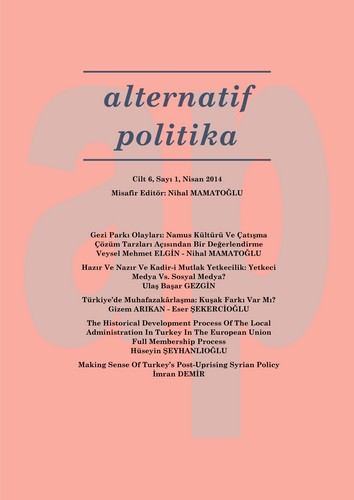Gezi Parki Olaylari: Namus Kültürü Ve Çatisma Çözüm Tarzlari Açisindan Bir Degerlendirme
Gezi Park Events: An Evaluation from the Perspectives of Honor Culture and Conflict Resolution Styles
Author(s): Veysel Mehmet Elgin, Nihal MamatoğluSubject(s): History of Education, Behaviorism, Sociology of Politics, Peace and Conflict Studies
Published by: Rasim Özgür DÖNMEZ
Keywords: Gezi Park Events; Honor Culture; Conflict Resolution Styles;
Summary/Abstract: The aim of this study is examining the perception of Gezi Park Events, which have emerged late May 2013, on its first 15 days by university students mainly within the framework of honor culture and conflict resolution styles. For this purpose, three focus group studies conducted on 7th and 12th June of 2013 by the participation of Abant Izzet Baysal University were analyzed. In this study, the emergence and the development of Gezi Park Events were examined by mutual and dynamic perspective from the angles of both protestors and the authorities (i.e., law-enforcement officers, government officials). Focus group data revealed that focus group participants’ interpretations about the attitude and behaviors of the protestors and authorities are in line with the expectations of the honor culture. To exemplify, focus group participants claimed that protestors may have perceived the authorities’ expressions and behaviors towards themselves as insult (i.e., humiliation); which in turn, this perception may have resulted in the occurrence of emotional (e.g., anger) and behavioral (e.g., protests, marching) reactions. Similarly, it was claimed that also authorities may have perceived the protests and protestors’ attitudes and behaviors as insults towards themselves and their power; which in turn, authorities may have seen any kind of stepping back as a sign of weakness. Accordingly, it can be claimed that focus group participants perceived the development of Gezi Park Events from a dynamic perspective where the protestors’ and the authorities’ acts activate each other’s acts. In addition to this, from the perspective of conflict resolution styles, the issues of the both parties’ not-stepping back, mutual verbal and physical violent acts indicate the usage of competing conflict resolution style in general. In this perspective, it is discussed that competing conflict resolution style comes up as a function and the result of honor culture, and the study provides a theoretical perspective on the relationships between honor culture and conflict resolution styles.
Journal: Alternatif Politika
- Issue Year: 6/2014
- Issue No: 1
- Page Range: 3-31
- Page Count: 29
- Language: Turkish

